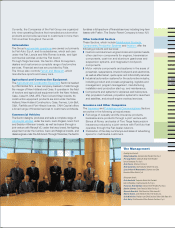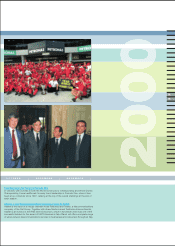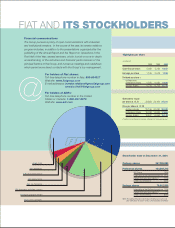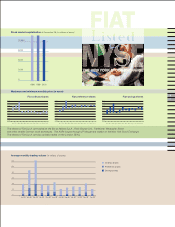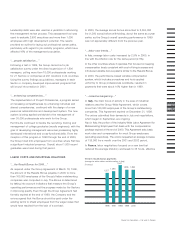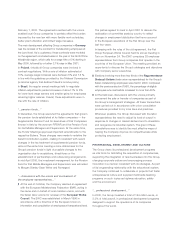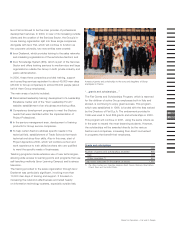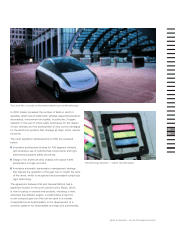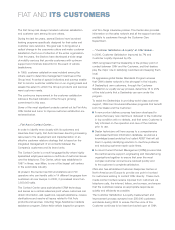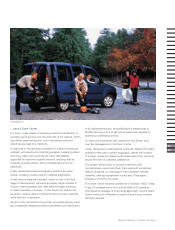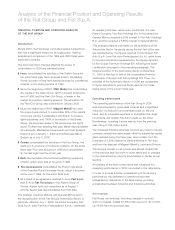Chrysler 2000 Annual Report Download - page 25
Download and view the complete annual report
Please find page 25 of the 2000 Chrysler annual report below. You can navigate through the pages in the report by either clicking on the pages listed below, or by using the keyword search tool below to find specific information within the annual report.
February 1, 2000. The agreements reached with the unions
enabled local Group companies to partially offset the burden
imposed by the new law with more flexible work schedules,
better plant utilization and limited wage increases.
The main development affecting Group companies in Germany
was the renewal of the contract for metalworking employees at
the Land level. As is customary, these contracts were modeled
on the agreement concluded earlier in the year in the North Rhine
Westphalia region, which calls for a wage hike of 3% starting in
May 2000, followed by a further 2.1% raise in May 2001.
In Poland, virtually all Group companies were involved in
contract negotiations. With a rate of inflation estimated at
10%, average wage increases were between 6% and 7.5 %,
in line with the guidelines provided by the Trilateral Commission
(a national agency that defines Poland’s income policy).
In Brazil, the regular annual meetings held to negotiate
inflation adjustments yielded increases of about 7% to 8%
for lower-level wage earners and smaller gains for employees
receiving higher salaries. Overall, these adjustments were in
line with the rate of inflation.
“…pension funds…”
In December, the Group executed the agreements that govern
the pension funds established at its Italian companies — the
Supplemental Pension Fund for Executives of Fiat Companies
(known in Italy by the acronym FIPDAF) and the Pension Fund
for Fiat Middle Managers and Supervisors. At the same time,
the Funds’ Meetings approved important amendments to the
respective Bylaws. These changes were made to redefine the
benefit contribution system, making it consistent with recent
changes in the tax treatment of supplemental pension funds,
while at the same time creating a more stable base for the
Group’s pension funds in light of possible changes to the
organization due to acquisitions, divestitures or the
establishment of partnerships and outsourcing arrangements.
In mid April 2000, the investment management for the Pension
Fund for Fiat Middle Managers and Supervisors was entrusted
to Morgan Stanley Dean Witter and Romagest.
“…discussions with the unions and involvement of
the employee representatives…”
❚At the end of October, the Company reached an agreement
with the European Metalworkers Federation (EMF), acting in
the name and on behalf of local member unions, and with
the Italian labor unions for renewal of the European Works
Council. The EWC was established in March 1996 in
accordance with a directive of the European Union on
information and consultation of employees at transnational level.
The parties agreed to meet in April 2001 to discuss the
reallocation of committee seats by country to reflect
changes in employment distribution that have occurred
in the European operations of the Fiat Group over the
last four years.
In keeping with the rules of the old agreement, the Fiat
Group European Works Council held its annual meeting in
Turin on November 24. The EWC comprises 28 employee
representatives from Group companies that operate in the
countries of the European Union. The meeting provided an
opportunity to discuss the Group’s strategies and objectives
with Company senior executives.
❚Elections involving more than two thirds of the Rappresentanze
Sindacali Unitarie (trade union representatives) for the Group’s
Italian metalworking employees were held in 2000. Compared
with the previous election (1997), the percentage of eligible
employees who cast ballots increased to more than 80%.
❚At the field level, discussions with the unions primarily
concerned the sale or transfer of companies as part of
the Group’s management strategies. All these transactions
were carried out in accordance with union consultation
procedures provided for by local laws and practices.
Whenever possible, the Group discussed with the labor
representatives the need to adjust its level of output in
response to changes in market demand and to streamline
and reorganize its industrial system. The goal of these
consultations was to identify the most effective ways of
helping the Company improve its competitiveness while
protecting employment.
PROFESSIONAL DEVELOPMENT AND CULTURE
The Group views its professional development programs
as vital tools for facilitating the acquisition of competencies,
supporting the integration of new businesses into the Group,
changing corporate culture and encouraging process
innovation in a manner consistent with its strategies. As part
of its longstanding relationship with the educational system,
the Company continued to collaborate in projects that foster
entrepreneurial culture and supplied multimedia teaching
programs on such topics as highway education, safety
and the environment.
“…professional development…”
In 2000, the Group invested a total of 144 million euros, or
2.3% of total payroll, in professional development programs
designed to support the operations of its companies
throughout the world.



